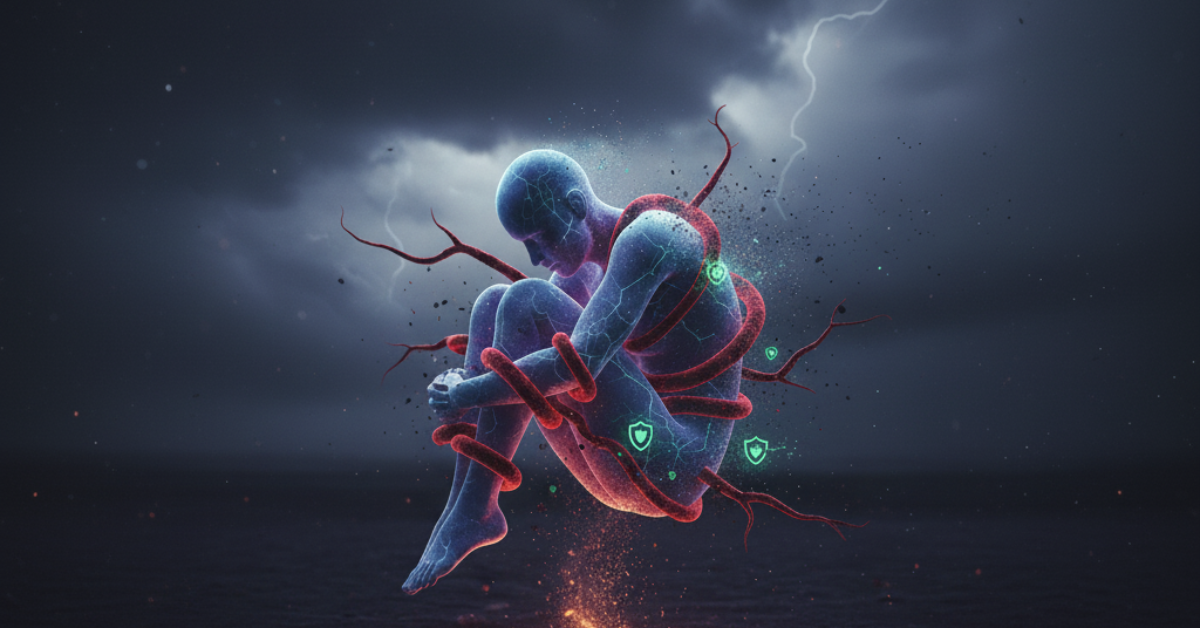As men age, a silent transformation occurs beneath the surface—one that affects every aspect of vitality from energy levels and muscle mass to mood and cognitive function. While this hormonal shift is as natural as graying hair, its impact can be profound and life-altering.
If you've noticed declining energy, mood swings, difficulty building muscle, or a general sense that you're not the man you used to be, you're not alone. Research shows that testosterone levels decline approximately 1% yearly after age 30, with 20% of men over 60 experiencing clinically significant hormonal changes. But here's what matters most: understanding these changes empowers you to take informed action.
This comprehensive guide will walk you through the science of male hormonal aging, help you recognize the signs, and explore both medical and natural approaches to maintaining vitality throughout your life. Whether you're in your 40s noticing the first signs of change or in your 60s seeking to optimize your health, this article provides the roadmap you need.
The Hormonal Aging Timeline: What Happens Decade by Decade
The 30s: The Beginning of Decline
Male hormonal aging doesn't announce itself with fanfare. It begins subtly in your early 30s when testosterone production starts its gradual but steady decline. During this decade:
-
Testosterone drops by 1% annually on average
-
Free testosterone begins declining faster than total testosterone due to increasing levels of sex hormone-binding globulin (SHBG)
-
DHEA levels start decreasing by approximately 2% per year
-
Growth hormone production begins slowing, affecting recovery and muscle maintenance
Most men in their 30s don't notice significant symptoms, but the foundation for future changes is being laid. This is actually the optimal time to establish healthy lifestyle habits that can slow the aging process.
The 40s: Recognizable Changes Emerge
The 40s mark when hormonal changes become more noticeable. Key developments include:
-
Cumulative testosterone decline reaches 10-15% from peak levels
-
Cortisol-testosterone balance shifts, with stress hormones often gaining dominance
-
Sleep quality begins declining, further impacting hormone production
-
Muscle mass starts decreasing at a rate of 3-4% per decade in men with hormonal imbalances
This decade is when many men first notice energy dips, longer recovery times from exercise, and changes in body composition despite maintaining similar lifestyle habits.
The 50s and Beyond: Accelerated Changes
After age 50, hormonal changes often accelerate:
-
Testosterone levels may drop 20-30% from peak values
-
Andropause symptoms become more pronounced in susceptible individuals
-
Cardiovascular health considerations increase as hormones affect heart health
-
Cognitive impacts become measurable, with studies showing 14% slower processing speed in men with low testosterone
Understanding the Symptom Recognition Matrix
Recognizing age-related hormonal changes can be challenging because symptoms often develop gradually and can overlap with other health conditions. Here's how to distinguish between different types of changes:
Energy and Physical Symptoms
Classic Hormonal Decline Indicators:
-
Persistent fatigue despite adequate sleep
-
Decreased motivation and drive
-
Longer recovery times from physical activity
-
Reduced muscle mass and strength despite consistent exercise
-
Increased abdominal fat accumulation
Distinguishing Features:
Unlike temporary fatigue from stress or poor sleep, hormone-related energy decline tends to be persistent and doesn't improve significantly with rest. The fatigue often feels deeper and affects both physical and mental energy.
Mood and Cognitive Changes
Hormonal Mood Impacts:
-
Increased irritability or mood swings
-
Decreased confidence and assertiveness
-
Mild depression or persistent low mood
-
Difficulty concentrating and mental fog
-
Reduced competitive drive
Research Insight: Studies have shown that men with low testosterone demonstrate 14% slower cognitive processing speed compared to men with normal levels, highlighting the significant impact on mental performance.
Physical and Sexual Health Changes
Body Composition Changes:
-
Loss of muscle mass (sarcopenia)
-
Increased body fat, particularly around the midsection
-
Decreased bone density
-
Changes in hair growth patterns
Sexual Health Indicators:
-
Reduced libido and sexual interest
-
Changes in erectile function
-
Decreased sexual satisfaction
-
Altered orgasm intensity
Medical vs. Natural Interventions: A Comprehensive Comparison
Understanding your options is crucial for making informed decisions about addressing hormonal aging. Both medical and natural approaches have their place, and the best choice depends on your individual circumstances, health status, and preferences.
Testosterone Replacement Therapy (TRT): The Medical Approach
How TRT Works:
TRT involves supplementing the body's natural testosterone production through various delivery methods including gels, injections, patches, or pellets. The goal is to restore testosterone levels to the normal range for younger men.
Proven Benefits:
-
Significant energy improvements: Studies show approximately 30% improvement in energy levels
-
Enhanced sexual function: Yale research demonstrated 47% improvement in sexual function
-
Muscle mass preservation: Can prevent or reverse age-related muscle loss
-
Bone density protection: Helps maintain skeletal health
-
Mood stabilization: Often improves depression and irritability
Important Considerations:
-
Cardiovascular monitoring required: TRT can increase red blood cell production (hematocrit) in 15% of users
-
Prostate health surveillance: Regular screening necessary
-
Potential side effects: Include acne, sleep apnea, and testicular atrophy
-
Long-term commitment: Often requires lifelong treatment
-
Cost considerations: Can be expensive and may not be covered by insurance
FDA-Approved vs. Compounded Options:
FDA-approved TRT products undergo rigorous testing for safety and efficacy. Compounded testosterone, while legal when prescribed by a physician, lacks the same regulatory oversight and may have quality variations.
Natural Approaches: Evidence-Based Alternatives
Natural interventions focus on supporting the body's own hormone production and optimizing overall health. While generally safer than medical interventions, they typically produce more gradual results.
Lifestyle Optimization for Hormonal Health:
Sleep Enhancement:
-
Target 7-9 hours of quality sleep nightly
-
Maintain consistent sleep schedule to support circadian rhythm
-
Create optimal sleep environment with cool, dark conditions
-
Research shows that sleep deprivation can reduce testosterone by up to 15%
Exercise Protocols:
-
Resistance training can increase testosterone by 17% in 12 weeks
-
High-intensity interval training (HIIT) supports hormone production
-
Avoid excessive endurance training which can suppress testosterone
-
Recovery periods are crucial for hormonal optimization
Nutritional Strategies:
-
Adequate protein intake (0.8-1.2g per kg body weight) supports muscle maintenance
-
Healthy fats (omega-3s, monounsaturated fats) are essential for hormone production
-
Zinc and vitamin D deficiencies are linked to low testosterone
-
Limit processed foods and excess sugar which can negatively impact hormonal balance
Stress Management:
-
Chronic stress elevates cortisol, which suppresses testosterone
-
Meditation and mindfulness practices have shown hormonal benefits
-
Regular relaxation techniques support overall hormonal health
-
Work-life balance is crucial for long-term vitality
Natural Supplements: The Science Behind Herbal Support
Several natural compounds have shown promise in supporting male hormonal health, though results vary among individuals.
Scientifically-Studied Compounds:
Panax Ginseng:
-
Traditional use supported by modern research
-
May help improve energy and stamina
-
Contains ginsenosides that support overall vitality
-
Studies suggest benefits for both physical and mental performance
Horny Goat Weed (Epimedium):
-
Contains icariin, studied for its bioactive properties
-
Traditional Chinese medicine application for male health
-
May support circulation and energy levels
-
Often included in comprehensive male health formulations
Cordyceps:
-
Adaptogenic mushroom with extensive research
-
Supports energy production at the cellular level
-
May help with physical endurance and stamina
-
Contains unique bioactive compounds like cordycepin
Tongkat Ali (Eurycoma longifolia):
-
Research suggests may help support healthy testosterone levels
-
Traditional Southeast Asian remedy for male vitality
-
Studies indicate potential benefits for energy and mood
Important Considerations for Natural Supplements:
-
Quality and purity vary significantly between manufacturers
-
Look for products with third-party testing and quality certifications
-
Natural doesn't automatically mean safe—interactions with medications are possible
-
Results typically take 4-8 weeks of consistent use to become apparent
Age-Specific Strategies for Hormonal Health
Different decades of life require tailored approaches to hormonal optimization. Here's how to adapt your strategy based on your age and life stage.
Men in Their 40s: Prevention and Early Intervention
Primary Focus: Preventing accelerated decline and maintaining current function
Key Strategies:
-
Establish comprehensive baseline testing including total testosterone, free testosterone, DHEA, and cortisol
-
Optimize sleep hygiene before symptoms become pronounced
-
Implement stress management practices to prevent cortisol dominance
-
Begin targeted strength training to preserve muscle mass
-
Consider preventive nutritional support with high-quality supplements
Lifestyle Priorities:
-
Work-life balance optimization
-
Regular cardiovascular exercise
-
Nutritional foundation building
-
Annual health monitoring
Men in Their 50s: Active Management and Optimization
Primary Focus: Addressing noticeable changes while maintaining quality of life
Key Strategies:
-
Comprehensive hormonal assessment including cardiovascular risk factors
-
Intensified lifestyle interventions with measurable goals
-
Consider combination approaches (lifestyle + natural supplements)
-
Regular monitoring and adjustment of strategies
-
Address emerging health concerns proactively
Specific Considerations:
-
Cardiovascular health becomes increasingly important
-
Prostate health monitoring
-
Bone density assessment
-
Metabolic health evaluation
Men 60 and Beyond: Comprehensive Vitality Maintenance
Primary Focus: Maintaining independence, vitality, and quality of life
Key Strategies:
-
Individualized assessment considering overall health status
-
Safety-first approach to any interventions
-
Focus on functional improvements rather than just numbers
-
Integrate with other health management strategies
-
Regular reassessment as health needs change
Quality of Life Priorities:
-
Maintaining physical independence
-
Cognitive health preservation
-
Social engagement and mood stability
-
Safety considerations for all interventions
Risk Assessment and Safety Monitoring
Whether you choose medical interventions, natural approaches, or a combination, proper monitoring is essential for safety and effectiveness.
Essential Health Markers to Track
Hormonal Markers:
-
Total testosterone (normal range: 300-1000 ng/dL)
-
Free testosterone (often more important than total)
-
Estradiol (testosterone converts to estrogen)
-
DHEA-S (adrenal hormone marker)
-
Cortisol (stress hormone)
Cardiovascular Markers:
-
Complete blood count (CBC) to monitor hematocrit
-
Lipid panel (cholesterol, triglycerides)
-
Blood pressure monitoring
-
C-reactive protein (inflammation marker)
-
Homocysteine levels
Additional Important Markers:
-
Prostate-specific antigen (PSA) for men over 40
-
Liver function tests (especially if using supplements)
-
Kidney function markers
-
Blood glucose and insulin levels
-
Thyroid function tests
Understanding Cardiovascular Considerations
The relationship between male hormones and cardiovascular health is complex and individualized. Key considerations include:
Risk Factors:
-
Men with existing cardiovascular disease require careful evaluation
-
Family history of heart disease increases monitoring needs
-
Lifestyle factors (smoking, obesity) compound risks
-
Age-related cardiovascular changes affect treatment decisions
Protective Strategies:
-
Regular cardiovascular exercise
-
Mediterranean-style diet
-
Stress management
-
Regular monitoring of blood pressure and lipids
-
Avoiding smoking and excessive alcohol
Home Monitoring and Professional Care
What You Can Monitor at Home:
-
Energy levels and mood patterns
-
Sleep quality and duration
-
Exercise performance and recovery
-
Body composition changes
-
Blood pressure (with proper equipment)
When Professional Monitoring is Essential:
-
Any medical interventions require professional oversight
-
Significant symptoms or rapid changes
-
Family history of hormonal cancers
-
Existing cardiovascular disease
-
Taking medications that might interact with treatments
Creating Your Personalized Vitality Protocol
Developing an effective approach to maintaining male vitality requires a personalized strategy that considers your age, health status, preferences, and goals.
Step 1: Comprehensive Assessment
Self-Assessment Questions:
-
What specific symptoms are most bothersome?
-
How do these changes affect your daily life and goals?
-
What is your risk tolerance for interventions?
-
Do you prefer natural approaches or are you open to medical interventions?
-
What is your budget for addressing these concerns?
Professional Evaluation:
-
Complete physical examination
-
Comprehensive blood work
-
Cardiovascular assessment
-
Discussion of symptoms and goals
-
Review of medical history and medications
Step 2: Choosing Your Primary Approach
Conservative Natural Approach:
Ideal for men with mild symptoms who prefer minimal intervention:
-
Lifestyle optimization (sleep, exercise, nutrition, stress management)
-
High-quality natural supplements with research backing
-
Regular monitoring of progress and symptoms
-
Gradual implementation of changes
Comprehensive Natural Protocol:
For men seeking more aggressive natural intervention:
-
Intensive lifestyle modification
-
Targeted supplementation with multiple evidence-based compounds
-
Professional guidance from integrative health practitioners
-
Regular biomarker monitoring
Medical Intervention Consideration:
For men with significant symptoms affecting quality of life:
-
Consultation with qualified hormone specialists
-
Comprehensive risk-benefit analysis
-
Careful monitoring and adjustment protocols
-
Integration with lifestyle approaches for optimal results
Step 3: Implementation and Monitoring
Timeline Expectations:
-
Lifestyle changes: Results typically visible in 4-8 weeks
-
Natural supplements: Benefits often apparent in 6-12 weeks
-
Medical interventions: Initial improvements in 2-6 weeks, full benefits in 3-6 months
Tracking Progress:
-
Keep a symptom and energy diary
-
Regular body composition assessments
-
Periodic blood work to monitor biomarkers
-
Adjust strategies based on results and side effects
The Holistic Vitality Framework
True male vitality extends beyond just hormone levels. The most successful approaches integrate multiple aspects of health and well-being.
Physical Vitality Components
Cardiovascular Health:
-
Regular aerobic exercise
-
Heart-healthy nutrition
-
Blood pressure management
-
Cholesterol optimization
Musculoskeletal Health:
-
Resistance training for muscle preservation
-
Flexibility and mobility work
-
Bone density optimization
-
Injury prevention strategies
Metabolic Health:
-
Blood sugar regulation
-
Healthy body composition
-
Efficient energy production
-
Optimal nutrient absorption
Mental and Emotional Vitality
Cognitive Function:
-
Mental stimulation and learning
-
Stress management for brain health
-
Adequate sleep for cognitive recovery
-
Social engagement and connection
Emotional Well-being:
-
Purpose and meaning in life
-
Healthy relationships and social support
-
Stress resilience building
-
Professional fulfillment
Integrative Approaches
Traditional Medicine Integration:
-
Traditional Chinese Medicine principles
-
Ayurvedic approaches to male health
-
Western herbal medicine traditions
-
Modern nutritional science
Technology and Monitoring:
-
Wearable devices for tracking
-
Telemedicine consultations
-
Home testing options
-
Mobile apps for lifestyle tracking
Key Takeaways and Action Steps
Understanding male hormonal aging empowers you to take control of your vitality and quality of life. Here are the essential points to remember:
Essential Insights
-
Hormonal aging is natural but not inevitable in its severity—proactive approaches can significantly impact your experience
-
Individual responses vary greatly—what works for others may need adjustment for your unique situation
-
Earlier intervention typically yields better results—don't wait for severe symptoms to take action
-
Lifestyle factors have profound impact—sleep, exercise, nutrition, and stress management are foundational
-
Both natural and medical approaches have merit—the best choice depends on your individual circumstances
-
Professional guidance enhances safety and effectiveness—work with qualified practitioners for optimal results
-
Long-term success requires ongoing commitment—sustainable approaches are more valuable than quick fixes
Immediate Action Steps
Week 1-2: Assessment and Planning
-
Complete a comprehensive symptoms assessment
-
Schedule a physical examination and lab work
-
Research qualified practitioners in your area
-
Begin tracking your current energy, mood, and physical symptoms
Week 3-4: Foundation Building
-
Optimize sleep hygiene and establish consistent sleep schedule
-
Begin or enhance regular exercise routine
-
Evaluate and improve nutritional habits
-
Implement stress management practices
Month 2-3: Enhanced Intervention
-
Consider natural supplements based on research and professional guidance
-
Fine-tune lifestyle approaches based on initial results
-
Monitor progress and adjust strategies as needed
-
Maintain regular communication with healthcare providers
Ongoing: Long-term Vitality Maintenance
-
Regular monitoring and assessment
-
Adaptation of strategies as you age
-
Continued education about new developments
-
Maintenance of healthy lifestyle habits
Final Thoughts
Male hormonal aging doesn't have to mean accepting decline as inevitable. With proper understanding, appropriate interventions, and consistent commitment, men can maintain vitality, energy, and quality of life well into their later years.
The key is finding the right balance of approaches that work for your individual situation. Whether you choose natural methods, medical interventions, or a combination of both, the most important step is to start taking action. Your future self will thank you for the investments you make in your health and vitality today.
Remember, aging is a privilege denied to many. Approaching it with knowledge, preparation, and proactive strategies allows you to make the most of every year ahead. The science of male hormonal health continues to advance, offering new hope and options for men at every stage of life.
Take charge of your hormonal health today, and discover what's possible when you combine the wisdom of age with the vitality of youth.
---
For more information about natural approaches to male vitality, including research-backed supplements that support hormonal health, explore evidence-based options that combine traditional wisdom with modern science.





